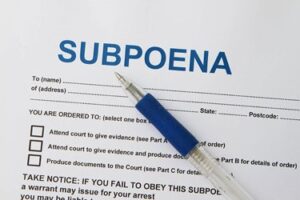 By Gerald L. Maatman, Jr., Alex W. Karasik, and Nicolette J. Zulli
By Gerald L. Maatman, Jr., Alex W. Karasik, and Nicolette J. Zulli
Duane Morris Takeaways: In EEOC v. Eberspaecher North America Inc. , No. 21-13799, 2023 U.S. App. LEXIS 11466 (11th Cir. May 10, 2023), a split three judge-panel for the U.S. Court of Appeals for the Eleventh Circuit affirmed an Alabama federal district court’s ruling and held that that an EEOC subpoena for nationwide information relative to an investigation over potential disability discrimination was too broad in scope.
Given that the EEOC’s pre-suit subpoena power is rarely limited by courts, this ruling is vitally important and apt to be cited by employers who are confronted with far-reaching EEOC subpoenas, particularly for nationwide employee data.
Case Background
A former employee at Eberspaecher North America Inc.’s (“ENA”) Northport, Alabama facility filed a charge with the EEOC, alleging ADA violations due to disability-related absences and his subsequent termination. Id. at *4. The initial charge listed only the Northport facility’s address and alleged discriminatory practices related to qualified leave. The charge did not advance any nationwide allegations.
In response, the EEOC requested information exclusively pertaining to the charged conduct from ENA’s Northport facility. However, the EEOC later requested nationwide nationwide data on employees terminated for attendance infractions at all of ENA’s locations. ENA declined to provide this information, leading the EEOC to issue a subpoena demanding the nationwide data.
On June 30, 2021, the EEOC filed an application for judicial enforcement of the subpoena with the U.S. District Court for the Northern District of Alabama. ENA moved to revoke the subpoena, arguing that it exceeded the scope of the charge. The District Court ruled in favor of ENA, ordering compliance with the subpoena limited to the Northport facility. The EEOC appealed the decision. Id. at *9.
The Eleventh Circuit’s Decision
The Eleventh Circuit affirmed the District Court’s order that ENA comply with the subpoena, “but only as it applies to [ENA’s] Northport facility.” Id. at *8.
On appeal, the EEOC attempted to argue that (1) because the charge was based on a review of ENA’s company-wide handbook; and (2) because the use of the term “aggrieved employees” in the charge meant “all employees” impacted by ENA’s allegedly unlawful practices, it was entitled to nationwide data. Id. at *16.
The Eleventh Circuit rejected these arguments because it presupposed that the charge targeted ENA facilities worldwide. Specifically, the Eleventh Circuit concluded that the charge, which solely referenced ENA’s Northport facility, constrained the EEOC’s subpoena power. It emphasized that the relevance of the requested information should be tied to the charge against the employer and not future charges. Additionally, the Eleventh Circuit noted that the EEOC never attempted to amend the charge to expand its scope. Id.
Rejecting the EEOC’s broad request for information, the Eleventh Circuit explained that “[t]he relevance that is necessary to support a subpoena for the investigation of an individual charge is relevance to the contested issues that must be decided to resolve that charge, not relevance to issues that may be contested when and if future charges are brought by others.” Id. at *5 (citing EEOC v. Royal Caribbean Cruise, Ltd., 771 F.3d 757, 761 (11th Cir. 2014)). The Eleventh Circuit further explained that the charge did not provide notice of an investigation into ENA’s facilities nationwide. Accordingly, the Eleventh Circuit held that the District Court did not abuse its discretion by enforcing the EEOC’s subpoena of information only as to the Northport facility.
Implications For Employers
The Eberspaecher decision is noteworthy because court rulings that restrict the EEOC’s pre-suit enforcement actions are uncommon, particularly at the appellate level. This decision provides a roadmap for employers to challenge subpoenas or requests for information that exceed the charge’s scope.
While this decision represents a significant blow to the EEOC’s common practice of seeking company-wide data in administrative subpoenas, employers should note that the EEOC may seek to amend charges to include systemic allegations before serving future subpoenas. Accordingly, while this ruling is a rare management-side victory in EEOC subpoena enforcement actions, it remains to be seen whether future charges will be pleaded with an eye towards nationwide discovery in light of this new roadblock.
